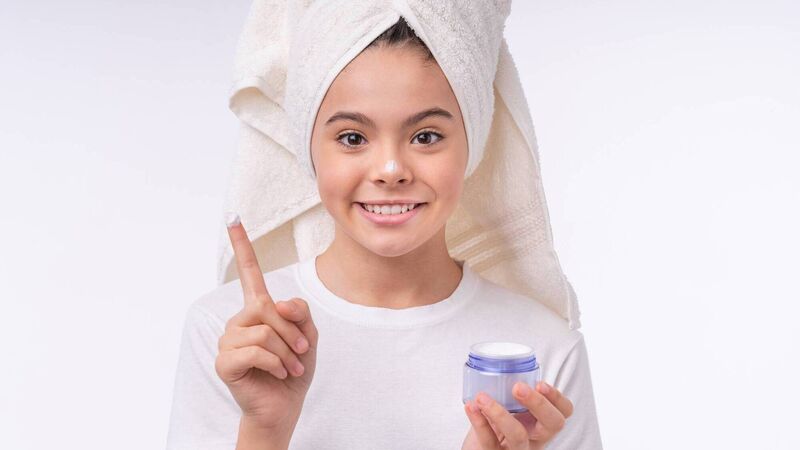Colman Noctor: The ugly side of skincare routines for young girls

Dr Colman Noctor: The use of skin care products and worrying about the ageing process at 10 years is concerning; I see this as a symptom of a more significant problem
When I read my 11-year-old daughter’s letter to Santa this year, I noticed she had asked for ‘skincare’ as one of her gifts. I naively thought it was similar to what my sisters in the 1980s had got at Christmas — baskets with dainty little bars of coloured soaps packaged in a bed of potpourri. Gifts like these were all the rage for pre-teens then and were usually accompanied by some scented writing paper or fancy pens. However, what Santa left under the tree for my daughter was quite different: a series of expensive-looking moisturisers and creams.
I didn’t think much more about it until the topic came on my radar again last week when I heard numerous radio shows discussing the surge of pre-teen girls buying skin-care products. The radio talk show panellists described how TikTok influencers are driving the demand by promoting skincare creams to young girls.
After looking into this further, I discovered that this is a global issue. In the USA last Christmas, it was reported that skincare products took top priority on many of the wishlists of tweens, who spent 33% more on cosmetics and 19% more on skincare than the previous year.
The rise in popularity of social media's ‘Get ready with me’ makeup videos may be contributing to this early interest in skincare. Another possible reason for this spike may be North West, Kim Kardashian's nine-year-old daughter, who shared a video of her elaborate skincare routine last year.
The radio discussions I heard mostly concerned the practicalities of children using such products and the expense for parents. But no one mentioned the broader mental health implications when children as young as ten become so concerned about their appearance that they resort to using skincare products. The fact that any ten or 11-year-old is even aware that anti-ageing creams exist is worrying enough not to mind believing they need to use them.
For years, we have debated the negative influence of the beauty industry on girls' mental wellbeing. There was a time when we used to discuss the impact of glossy fashion magazines on women’s self-esteem and body image, but now the conversation has moved on to social media influencers driven by powerful algorithms. Prohibiting your child's access to the online world is no longer foolproof as their peers with access to a smartphone can tell them what they ‘need’ to do to have beautiful skin.
Having worked for over 25 years with young girls with eating disorders, I am all too aware of the pressures young girls are under regarding their body image and appearance. While the average age of onset of an eating disorder is 14 to 18 years of age, I’ve noticed these disorders are occurring more frequently in primary school-aged children.
According to researcher Carson Benowitz-Fredericks and colleagues at Johns Hopkins University, aspects of body image, such as low self-esteem and perfectionism, can lead adolescents to pursue unattainable physical appearances, which can be prerequisites for developing eating disorders.
Body image, says US psychologist Lauren Muhlheim, is a complex construct of beliefs, thoughts, perceptions and feelings about how we see ourselves and our bodies, often shaped during the teenage years.
The beauty industry promotes an ideal image of women, central to its commercial success. Of particular concern is the anti-ageing cohort, which often predicts serious consequences if you fail to use the right products. This pressure is a struggle for people of any age, never mind 10- and 11-year-olds.
The use of skin care products and worrying about the ageing process at ten years is concerning; I see this as a symptom of a more significant problem. Well-meaning experts might recommend that ten-year-olds use SPF and cleanser, but the notion of any skincare routine at that age is problematic.
Young girls’ growing interest in moisturisers and serums is further evidence that the period of childhood is shrinking. Children need to be allowed to be children without the burden of adult-like worries like the ageing process.
We all have issues about our self-image, no matter how we look, which is not new. In 1984, researchers coined the term “normative discontent” to describe the widespread weight dissatisfaction most people experience. However, normative discontent is usually associated with adults, not children.
A relatively carefree childhood is essential for healthy emotional development. Developing a deep self-consciousness about how we look should only become a feature of our lives when we are developmentally and emotionally mature enough to cope with them. We risk contaminating their childhood if we expose children to experiences that draw attention to how they should look and suggest steps to improve their appearance.
It is essential children mature in line with their psychological development and are not hot-housed by influencers or advertisers who want to peddle expensive products.
I am not suggesting that promoting ‘skincare routines’ to 10-year-old girls will result in them developing eating disorders or mental health problems. But if we prematurely endorse being conscious of their body image, we risk contributing to their developing a poor relationship with themselves, with long-term negative psychological consequences.
Pulling back on my daughter’s use of skin care products will be a challenge. I realise how difficult it is to counter the negative and pervasive influence of social media, but perhaps we need to do more to offer our children an alternative point of view.
I would suggest encouraging girls to develop other values besides how they look. We need to challenge the myths created by social media content creators by explaining the use of filters, Photoshop, etc. But most importantly, we need to value our children’s internal qualities, such as their kindness, courage and creativity and move their focus away from their shape, looks or indeed the quality of their skin.
- Dr Colman Noctor is a child psychotherapist






